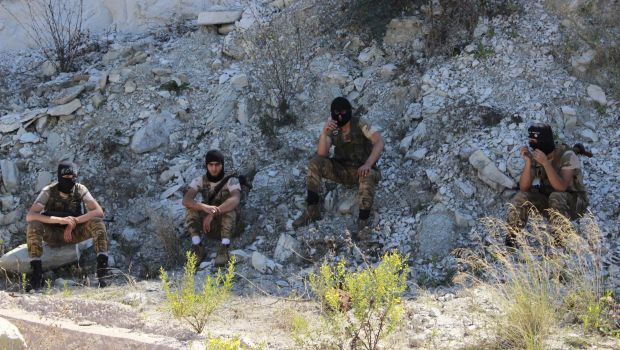
Free Syrian Army fighters rest in the Jabal al-Akrad area in Syria’s northwestern Latakia province October 16, 2013. REUTERS/Khattab Abdulaa
In the video, a rebel spokesman, backed by two dozen others carrying a Free Syrian Army (FSA) banner, says that “the Coalition and its leadership” have failed, and that almost 70 rebel groups based in southern Syria were withdrawing their support for it.
“Having seen the failure of the political groups that claim to represent the opposition and the revolutionary groups, we leaders of the military and revolutionary groups in the southern provinces withdraw our recognition from any political group that claims to represent us,” the spokesman said.
A spokesman for the FSA, Louay Mikdad, said that the video was genuine and informed the Associated Press news agency that the spokesman in the video was a member of the Anwar Al-Sunna group.
He denied that the move was a rejection of the FSA and its Turkey-based leadership, but said that the political wing of the Syrian opposition should re-think their relations with fighters inside Syria.
“We respect what they (the rebels) are saying,” he told the news agency. “We think our brothers in the Coalition…should listen to the people inside and they should open direct dialogue with them.”
The leadership of the FSA and the Coalition have been dogged by accusations that they are out of touch and unable to influence or assist the various rebel groups in Syria fighting to bring down the government of Bashar Al-Assad.
In an interview with Asharq Al-Awsat published this week, the FSA’s chief of staff, General Salim Idris, admitted to a “lack of material resources necessary to create a unified body.”
“I do not pretend that we have come to an ideal state or condition and the reason for that is that our material resources are weak, including our armament,” he added.
In late September, a number of Islamist rebel groups based in northern Syria announced that they were also cutting ties with the FSA and creating a separate organization.
In Wednesday’s video, the statement from the rebel groups said that they “are unifying the forces of the revolution militarily and politically,” but did not give further details.
The Coalition has also been dogged by internal disagreements over whether to attend the Syrian peace conference, dubbed “Geneva II,” planned to take place in late November in the Swiss city, with one major member, the Syrian National Council, threatening to withdraw if the Coalition goes ahead. The Syrian government has also expressed reluctance to negotiate with its opponents.
Speaking in Moscow on Thursday, Syrian deputy foreign minister Qadri Jamil said that the conference would take place on November 23 and 24, though this date has not been confirmed by the United Nations (UN), or the governments of the US and Russia, who have been pushing for the conference to take place.
Meanwhile, the Organisation for the Prohibition of Chemical Weapons (OPCW) announced on Wednesday that it had visited and assessed more than half of Syria’s declared 20 chemical weapons sites, and had destroyed chemical munitions at six of them.
A spokesman for the joint UN-OPCW team said on Thursday that he was confident that Syria’s chemical arsenal could be destroyed before the mid-2014 deadline, despite the civil war raging in the country and the difficulties of accessing some areas.
“We are on track. The team is confident, the morale is high and cooperation from the Syrian authorities has been forthcoming,” he said.
The OPCW, working in tandem with the UN, has been tasked with destroying Syria’s chemical weapons, as part of a US-Russian brokered agreement September after the Syrian government was accused of using rockets filled with sarin nerve gas to kill over a thousand civilians in Damascus on August 21. The organization, based in The Hague in the Netherlands, was recently awarded the Nobel Peace Prize for its efforts.
